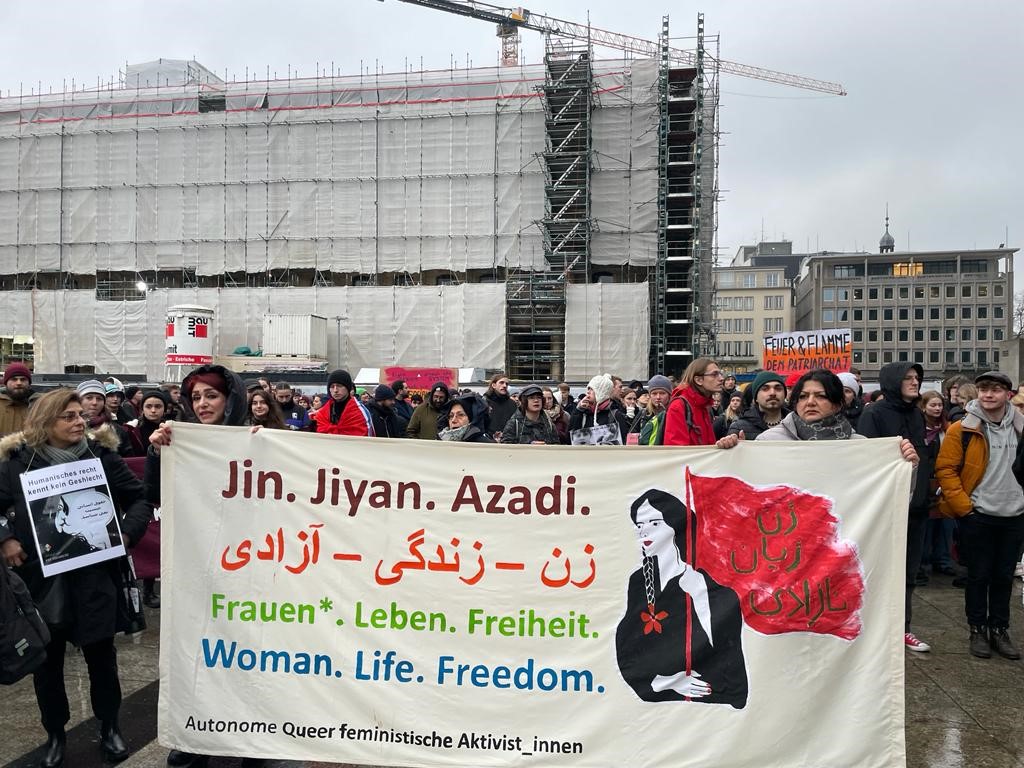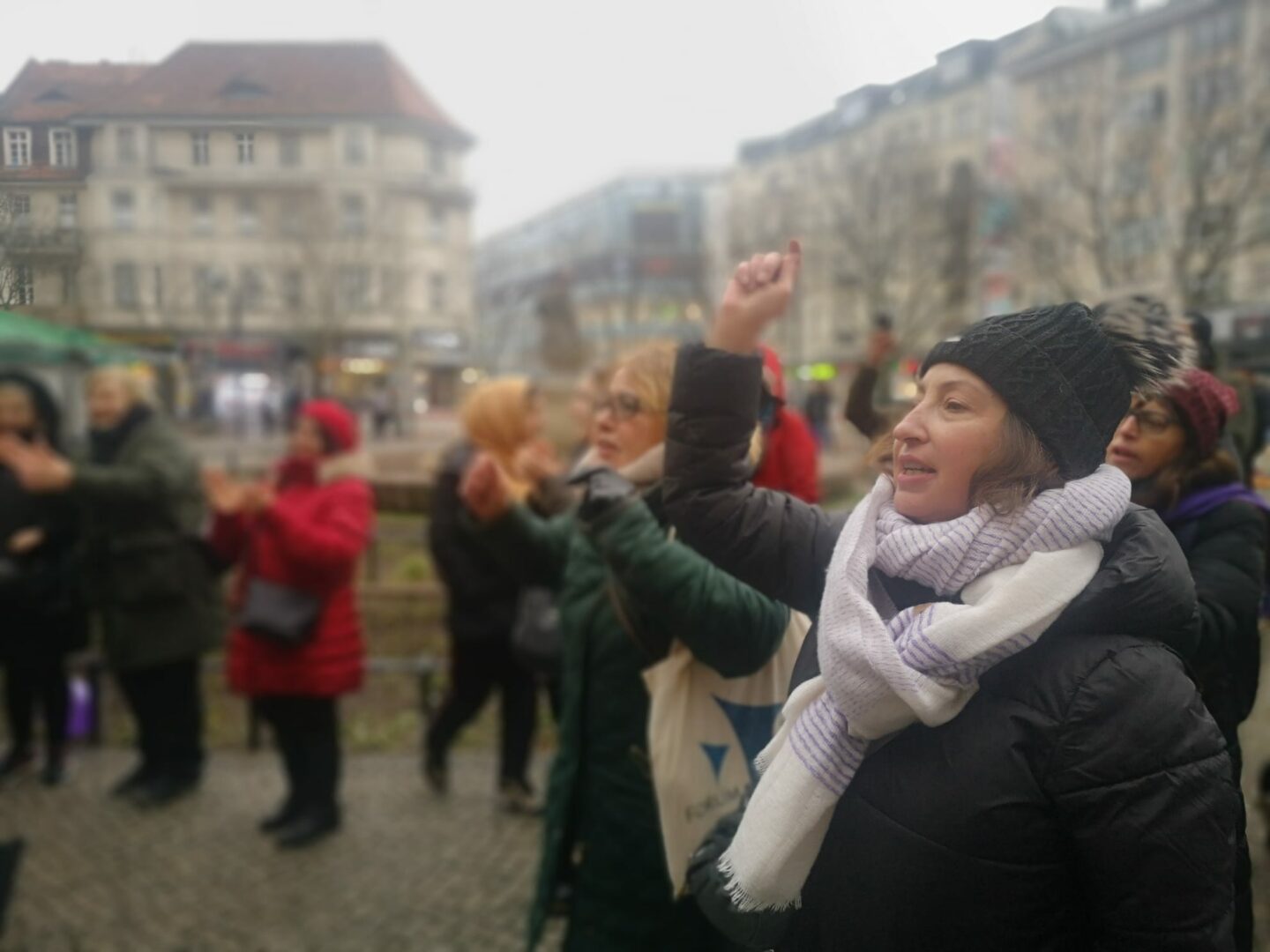X-ray structures: Intersectional, anti-racist feminism
Only on Wednesday, March 08.03.2023th, XNUMX was international feminist day of struggle (or international women's day) again. This naturally prompted us to cover intersectional feminism - the heart of DaMigra and our work - this week of the Migrant Women's March.
Intersectionality is the word of the hour and feminism is on everyone's lips, especially this week. But what exactly does intersectionality mean? What is intersectional, anti-racist feminism and what does this stance entail?
DaMigra women were on the streets across Germany – here are some insights.

What is intersectionality?
Intersectionality describes that different forms of discrimination can be directed against a person at the same time and that different forms of discrimination do not occur in isolation, but rather overlap and reinforce one another. Thus, this is an approach that explains the entanglement or crossover and interdependence of social categories such as ethnicity, gender, sexual identities, and social class together. Intersectionality shows this interaction. Intersectionality comes from the English word "intersection" - overlapping or intersection. The origins of the concept of intersectionality lie in black feminism and the African American working class movement.
Intersectionality sees differences but doesn't divide us based on them. Intersectionality in feminism assumes that feminism must be inclusive. For migrant women and refugees the fight for equality and against discrimination is different as they face many problems on different levels. They are not only discriminated against because of their gender, their perceived affiliation or the color of their skin, but they also experience pressure and stress from the community they come from and the community in which they live. Migrant and refugee women often speak not only for themselves, but also for their children and their community. Intersectional feminism exists to acknowledge and include this struggle and these experiences.

The idea is still widespread that, for example, all women are directly feminists or that all those affected by racism are also anti-racists. But that's not true.
We often see how sexism and women's lack of participation in many structural decisions are portrayed by many as the sole discriminatory features of feminism. So it presents the "dominant goal" of feminism as combating sexism - and that's it? This has a historical background. The apparently feminist debate has long been dominated by a group of white, not (visibly) disabled, high-income, cis women. For this very group, feminism is interpreted as being all about women's inability to participate in power. Taking this Western, liberal perspective on feminism without including racism, classism, or other forms of discrimination is repainting a wrong system rather than replacing it.
What does intersectional, anti-racist feminism demand? How can we break up structures with this approach?
- We want to take up the fight for all women. We want to take over the discourse and power of the social narrative, inclusive for all and with a focus on the women who have been made invisible up to now.
- We want to take up topics and perspectives that have not received enough attention and stand up for those that have received the least attention.
- We represent migrant women, Jewish women, queer people, refugee women, disabled women and women of color. We, intersectional, anti-racist feminists, feel that our own concerns, needs and interests are largely different from the majority white German women's movement ignored or patronized.
- With intersectionality, we want to have a platform on which we could not only take action against sexism, but also against racism, anti-Semitism, ableism and classism and where we could set topics in a participatory manner.

Representing intersectional, anti-racist feminism means naming and fighting multiple discrimination. It means seeing that we are diverse and that we (must and can) have different experiences in our diversity. But it also means making a clear decision to fight all forms of discrimination together in solidarity – not just those that affect us.
Feminism understood in this way addresses power asymmetries and abuse of power in society, in institutions, in structures. He is not only on the move for the individual particular interests of individual groups, but acts inclusively. This same feminism is interested in ALL socially relevant topics and is committed to human rights, equal opportunities and participation worldwide! Our understanding of feminism is that women are actors, not subjects. In it, our task is to recognize feminisms that have racist and exclusive characteristics, and responding to them means building on previous struggles. Feminists who represent an intersectional and anti-racist feminism are fighting against ethnic-nationalist, fundamentalist-religious, reactionary or racist and fascist forces all over the world!
DaMigra e. V. represents the interests of women migrant organizations and their concerns and is committed to equal opportunities, equal participation and equality for women with a migration background and refugee experience in Germany. DaMigra follows the approach of anti-racist feminism.
Reports
Umbrella organization
Between discrimination and exploitation: protection and health also for migrant women in the workplace!
April 28 marks World Day for Safety and Health at Work, an initiative of the United Nations International Labor Organization (ILO). But for women with...
WOMEN RAIS.ED
Umbrella organization
Racism and sexist discrimination must be fought EVERY DAY across society
Berlin, March 20.03.2024, 21. On March XNUMXst, the International Day for the Elimination of Racial Discrimination, there are numerous projects, events and offers on the topic of racism. Politicians and…
Brave together
Migrant womenMarch 2023
About the courage to carry on – a film by DaMigra eV
On March 13.03.2023, XNUMX, we will present a documentary short film in the context of our Germany-wide campaign “Migrant Women March”. Two women with a refugee or migration history share their personal stories by...
Appointments
MyTurn
Erfurt, 26 April 2024
Creative workshop: New paths, new dreams: My professional future in Germany
Dear women, dear interested parties, DaMigra eV cordially invites you to the creative workshop “New ways, new dreams: ...
WOMEN RAIS.ED
Online, 29 April 2024
Trialogue Israel-Palestine with Jouanna Hassoun and Shai Hoffmann
Dear interested parties, DaMigra e. V. and the anti-racism project women rais.ed invites you together with the Multicultural Forum and...